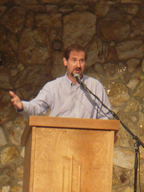In times of blessing and adversity, God is always revealing God’s self to us, said Randall Zachman in “Calvin’s Doctrine of Providence: The Special Care of God for All Creation,” his July 10 lecture at the Calvin Jubilee.
Zachman, professor of Reformed studies at Notre Dame University, was one of the speakers here to celebrate John Calvin’s 500th birthday July 8-11.
His lecture touched on Calvin’s view of God as a parent and a nursemaid, giving life to and caring for every creature.
“God is directly involved in everything that happens in the universe,” Zachman said Calvin believed, adding that the seminal Reformer also saw God as a judge and ruler who tries to bring order out of the events in life. “We inject the chaos and God injects the order.”
Zachman cited Matthew 10:29: “Are not two sparrows sold for a penny? Yet not one of them will fall to the ground apart from your Father.” This verse is evidence that God’s providence extends to all creatures, even non-human ones, he said.
“Do we think that God takes care of every single creature God has made?” Zachman asked. “If we do believe that, why are we acting the way we are toward them?”
Zachman cited the reduction of species, the pollution of water and deforestation as examples of ways God’s creation has been harmed by humans.
God’s value of all creation was something Calvin often thought about, Zachman said. God has filled the world with life and song, even in areas uninhabited by humans. This aspect of creation is awesome and is God’s business, and so all of creation — both the inhabited and uninhabited areas — should leave us breathless. Calvin wanted people to be aware of and astounded by nature, Zachman said.
“He wants us to think about these things, and not just in a passing way,” he said.
Zachman used the sea as an example of how Calvin saw the wonder of creation. For Calvin, the sea was terrifying and awesome. It is full of an abundance of life but can also be very destructive.
Calvin also thought about changing of the seasons and the great variety of food available to creatures, Zachman said. He realized that some members of the food chain can eat things that humans can’t, and this humbled him. Not everything was created just for humans.
“He wants us to have a deep, existential sense of our nothingness,” Zachman said. “We should be bowled over that among all the creatures God cares for ... God cares for us.”
Although other animals should, in a practical view, be higher on the food chain than humans, this is another example of God’s providence; God restrains the power and wrath of those animals so that humans are on top, Zachman said.
Two events in particular were astonishing for Calvin, Zachman said. One was childbirth. In Calvin’s time, the womb was seen as a watery tomb, and it was a miracle that a live baby ever came out.
“That a child comes out of the womb is a miracle that should leave you speechless,” Zachman said. “It’s what we understand about the world that should bowl us over.”
The fact that God has provided babies with readily available food and the means to get it through breastfeeding is another miracle Calvin saw.
The other event stunning to Calvin was God’s governance of the world. God made a difference between good and evil and reflects wrath through adversity and grace and blessings through prosperity, Calvin said.
Zachman used the example of a shipwreck in which hundreds die and one person lives. For Calvin, it was God’s judgment that the hundreds die and God’s grace that one lives. One survivor would have been enough for Calvin, but he knew that this wasn’t a pastoral answer, that people would have a problem accepting this explanation.
God is righteous in all God’s ways, both when the poor are helped and also when they are made poorer. Christians need to remember that God is just, even in times of trouble. Nothing is more difficult during hard times than when God apparently forsakes us without cause, Zachman said. This leads people to become angry and impatient with God.
For Calvin, Jesus’ cry on the cross — “My God, my God, why have you forsaken me?” — should be the cry of believers every day. This feeling of being abandoned is not limited to Jesus’ crucifixion; all people feel this way.
But the important thing to remember is that Jesus still referred to God as “my” God, Zachman said.
“This is Christianity,” he said, adding that faith calls “my God” even when forsaken and abandoned.
“Even though the waves of your wrath are overwhelming me, you are my God,” he said.
Referring to Psalm 88, Zachman said we must never stop calling on God.
“The minute you stop praying, evil wins,” he said. “The minute you stop praying, you lose your life.”

